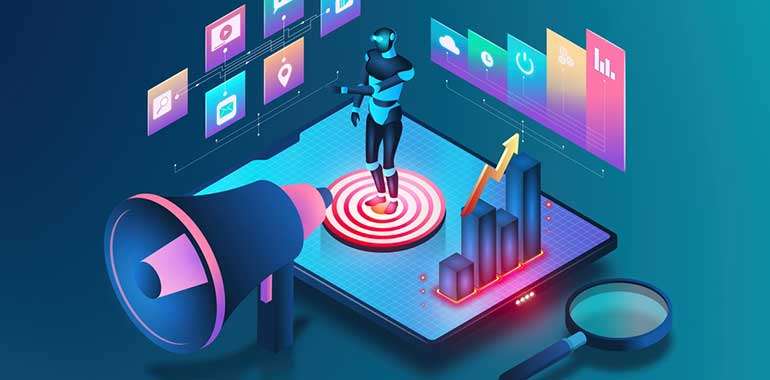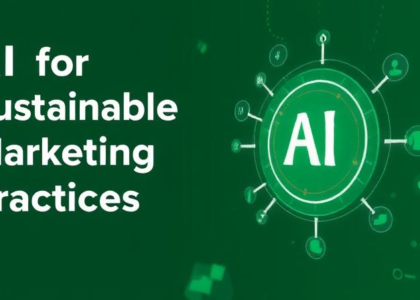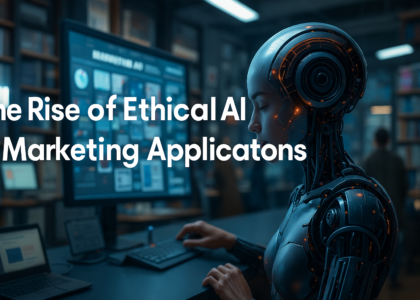Introduction
In today’s hyper-connected world, digital marketing is evolving faster than ever. With the explosion of new platforms—social media apps, voice assistants, smart TVs, wearables—brands can no longer rely on traditional approaches to reach audiences.
Artificial Intelligence (AI) has emerged as a game-changing force, enabling marketers to navigate this complex landscape efficiently and deliver highly personalized experiences across multiple digital channels.

The Rise of New Digital Channels
The digital frontier is expanding beyond traditional websites and email.
Platforms like TikTok, Snapchat, WhatsApp Business, and Alexa are transforming how people interact with brands.
Consumers now expect seamless, relevant, and instant engagement wherever they are—whether browsing Instagram, chatting on Messenger, or asking a voice assistant for product recommendations.
Traditional marketing struggles to manage such diversity and volume, creating the urgent need for smarter, scalable solutions.

How AI Transforms Multi-Channel Marketing
AI empowers marketers to turn this complexity into an advantage.
By processing vast amounts of real-time data, AI identifies patterns and segments audiences with pinpoint precision.
Predictive analytics helps marketers anticipate customer needs and behaviors before they even occur.
Moreover, AI can dynamically generate personalized content tailored to different devices, formats, and channels—making every interaction feel individually crafted.

Core AI Technologies Powering Cross-Channel Marketing
- Machine Learning analyzes customer behavior to deliver insights and predict future actions, improving targeting and retention strategies.
- Natural Language Processing (NLP) powers conversational interfaces such as chatbots and voice search, enabling brands to maintain human-like communication at scale.
- Computer Vision recognizes images and videos, allowing platforms like Instagram and Pinterest to better understand and classify user-generated content for targeted advertising.
- Automation manages and optimizes campaigns across multiple platforms, ensuring consistency while saving time and resources.

Key Use Cases and Applications
- Personalized Ad Campaigns: AI tailors ads based on channel-specific behaviors (e.g., mobile app usage vs. desktop browsing).
- AI-Powered Chatbots: Deliver 24/7 customer service and marketing support across messaging apps like Facebook Messenger and WhatsApp.
- Intelligent Product Recommendations: AI engines offer contextually relevant suggestions across websites, mobile apps, and smart devices.
- Voice Commerce: Brands optimize marketing for voice search and integrate with voice-activated devices like Amazon Echo and Google Home.

Benefits of Using AI Across Channels
- Consistent Messaging: AI ensures uniform brand voice and tone across platforms.
- Enhanced Customer Experience: Real-time personalization makes interactions more relevant and satisfying.
- Higher ROI: Smarter targeting and timing drive better conversion rates.
- Scalable Operations: AI allows smaller teams to manage broader campaigns effectively without burnout.
Challenges and Considerations
Despite the potential, deploying AI in marketing comes with challenges.
Data privacy and ethical considerations must be front and center.
Integrating AI into legacy systems can be technically complex and resource-intensive.
Marketers must maintain human oversight to avoid algorithmic bias and ensure meaningful engagement.
Additionally, investing in team training to work alongside AI tools is crucial for success.
Future Trends
Looking ahead, AI is set to unlock even more transformative opportunities:
- Hyper-Personalized VR/AR Experiences: Imagine AI creating real-time immersive shopping environments tailored to individual users.
- Autonomous AI Agents: AI bots could one day handle complete customer relationships without human intervention.
- Predictive Journey Mapping: Future AI systems will map customer journeys across entirely new ecosystems, like the Metaverse, predicting needs before they even surface.
Conclusion
AI is revolutionizing how brands connect with audiences across the expanding universe of digital channels.
It provides the intelligence, speed, and personalization needed to thrive in a fragmented digital world.
For marketers, integrating AI is no longer optional—it’s essential for survival and growth.
Now is the time to adopt AI-powered strategies and position your brand at the forefront of the next marketing revolution.




